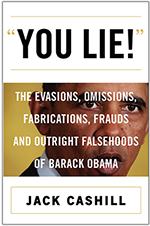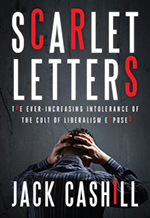12 Tips for Artfully Using Facebook for Politics
Order Jack Cashill's newest book,
Scarlet Letters
___
Get your copy of Jack Cashill's book, "You Lie!"

___
Get your copy of Deconstructing Obama

___
Jack Cashill's book:
Hoodwinked: How Intellectual Hucksters have Hijacked American Culture
© Jack Cashill
WND.com - February 3, 2016
At speaking engagements I am often asked, “As an average citizen, what can I do?” For the last several years, I have been recommending that people get on Facebook and become disseminators of real information, mini-publishers in their own private universe.
Given the sensibilities of your friends and relatives, this is a tricky proposition any time of the year and especially so during primary season. So allow me to offer what Dr. Peter Venkman might call some useful “guidelines.
1. Not all your friends and relatives agree with you.
Nothing is gained by driving them away.2. Facebook is best used when you add real info.
What you think has far less value than what you know and can substantiate. People will only read your posts if they trust you.
3. Make converts, not enemies.
Fluff up your postings with kids, grandkids, pets, and hospital photos, then slip in a zinger. The ideal zinger is a news item from a source your liberal friends respect that refutes their orthodoxy.
Liberals have their honest moments. The zinger article might come from the Atlantic or the New York Times and question the wisdom of, say, affirmative action or global warming or Muslim immigration. You add some benign comment like, “Food for thought,” and get on with your day.
4. Don’t trouble libs with conservative sources.
Liberals think of Fox News or even National Review as fiction. If a friend posts something dubious, find an article from one of one of his sources and post that as your response. Again, add some innocent remark like, “I thought the polar ice cap was supposed to be gone by now” or “The women of Cologne might disagree.”
5. Remember, people identify with their candidate.
Not unnaturally, they take harsh criticisms of their candidates as personal insults. In primary season, it is essential you keep this in mind.
If, for instance, you post on Facebook that Donald Trump is a “racist demagogue,” you are by extension labeling a healthy portion of your allies on the right as racist stooges. Chances are they will not warm up to that message or to any other message you might send in the next year or two.
6. Make the thoughtless think.
To the above post, you might ask, “Exactly whom has Trump maligned? ‘Mexican’ is no more a race than ‘American.’ “Muslim’ is no more a race than ‘Christian.’” Attack the premise, not the person.
7. Exclamation points and capital letters don’t persuade.
What follows is a real post I saw after the Iowa caucus: “Cruz is not only a PATHOLOGICAL LIAR but he is a Criminal Fraud for being a U.S. Senator and then for running for the Presidency as a man that has NO COUNTRY!!”
Considering that more than one in four Iowa Republicans just voted for Ted Cruz there is an excellent chance that the poster of the above message will have alienated one-fourth of his Republican friends and persuaded none of them, caps or no caps.
8. Don’t get tedious.
If you think we should End the Fed, implement a Fair Tax, ban chemtrails, or send Ted Cruz back to Canada, a once a month reminder to your friends is plenty.
9. Don’t get presumptuous.
On Wednesday morning, a Facebook friend declared that unless Rand Paul was the Republican nominee, he was leaving the Republican Party. An hour after this post, Paul withdrew from the race, and I was looking for the “unfriend” button. The natural response to your post ought not be “Who cares?”
10. Beware of parody sights.
There is no better way to humiliate yourself on Facebook than sending out a parody article and declaring it news. Sending a ten-year-old article as news comes in a close second.
11. Check your sources carefully before reposting.
If you are reading on Facebook that Bill Maher has found Jesus or that Hillary is going to prison, check your source thoroughly.
12. Bottom line: if an item seems too good to be true, it probably is.



